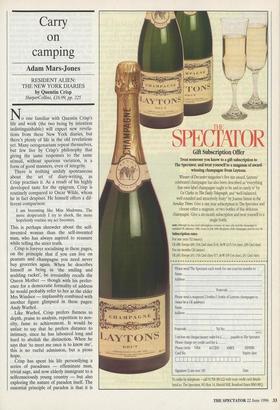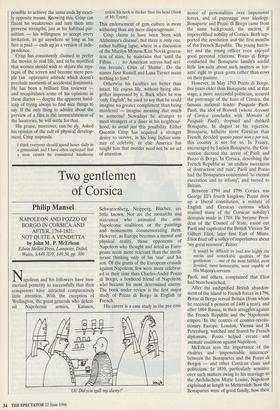Carry on camping
Adam Mars-Jones
RESIDENT ALIEN: THE NEW YORK DIARIES by Quentin Crisp HarperCollins, £16.99, pp. 225 No one familiar with Quentin Crisp's life and work (the two being by intention indistinguishable) will expect new revela- tions from these New York diaries, but there's plenty of life in the old revelations yet. Many octogenarians repeat themselves, but few live by Crisp's philosophy that giving the same responses to the same stimuli, without spurious variation, is a form of good manners, even of integrity.
There is nothing unduly spontaneous about the art of diary-writing, as Crisp practises it. As a result of his highly developed taste for the epigram, Crisp is routinely compared to Oscar Wilde, whom he in fact despises. He himself offers a dif- ferent comparison:
I am becoming like Miss Madonna. The more desperately I try to shock, the more hopelessly routine my act becomes.
This is perhaps shrewder about the self- invented woman than the self-invented man, who has always aspired to reassure while telling the strict truth.
Crisp is forever socialising in these pages, on the principle that if you can live on peanuts and champagne you need never buy groceries again. When he describes himself as being in 'the smiling and nodding racket', he irresistibly recalls the Queen Mother — though with his prefer- ence for a democratic formality of address he would probably refer to her as the elder Mrs Windsor — implausibly combined with another figure glimpsed in these pages: Andy Warhol. Like Warhol, Crisp prefers flatness to depth, praise to analysis, repetition to nov- elty, fame to achievement. It would be unfair to say that he prefers distance to intimacy, since he has laboured long and hard to abolish the distinction. When he says that 'to meet me once is to know me', this is no rueful admission, but a pious hope.
Crisp has spent his life personifying a series of paradoxes — effeminate man, trivial sage, and now elderly immigrant to a selfconsciously young country — but also exploring the nature of paradox itself. The essential principle of paradox is that it is possible to achieve the same ends by exact- ly opposite means. Knowing this, Crisp can flaunt his weaknesses and turn them into perverse strengths, just as his habitual par- asitism — his willingness to accept every invitation, to go anywhere so long as his fare is paid — ends up as a version of inde- pendence.
Crisp has consistently claimed to prefer the movies to real life, and to be mystified that women should wish to abjure the mys- tique of the screen and become mere peo- ple (an oppressive attitude which doesn't preclude moments of accidental feminism). He has been a brilliant film reviewer and recapitulates some of his opinions in these diaries — despite the apparent hand- icap of trying always to find nice things to say. If the only thing to admire about the preview of a film is the immaculateness of the lavatories, he will settle for that.
His praise, moreover, can be sly. Asked his opinion of the cult of physical develop- ment, Crisp responds:
I think everyone should spend hours daily in a gymnasium and I have often explained that a man cannot be considered handsome unless his neck is thicker than his head (think of Mr Tyson).
This endorsement of gym culture is more withering than any mere disparagement.
Crisp claims to have been 'born with Alzheimer's disease', but there is only one, rather baffling lapse, where in a discussion of the Marilyn Monroe/Kim Novak genera- tion of stars, he maintains that 'until the Fifties . . . no American actress had seri- ous breasts'. Cries of 'Shame'. Do the names Jane Russell and Lana Turner mean nothing to him?
Otherwise his faculties are better than intact. He enjoys life, without being alto- gether impressed by it. Back when he was `only English', he used to say that he could imagine no greater compliment than being murdered — imagine meaning that much to someone! Nowadays he arranges to meet strangers at a diner in his neighbour- hood, to avoid just this possibility. Either Quentin Crisp has acquired a stronger desire to survive, in his long Indian sum- mer of celebrity, or else America has taught him that murder need not be an act of attention.



























































 Previous page
Previous page